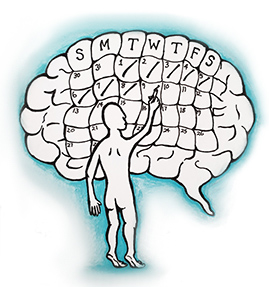Ongoing Concussion
 Stage four (Persistent symptoms)
Stage four (Persistent symptoms)
Most people (80 to 90%) will not continue into this stage, but will return to usual function following the previous three stages of recovery.
However, if your recovery has taken you months, it is important to work towards a balanced life where you can enjoy your work as well as your home and social life.
 Lifestyle balance following mild head injury
Lifestyle balance following mild head injury
As you try to resume all your roles, it is important to be mindful to:
- Get a good night’s sleep
- Give yourself more time than usual for each task, reduce time pressures
- Complete one task a at a time so to not overwhelm yourself as you readjust
- Not overthink / or ruminate over things that you cannot change or control (acceptance)
- Pre-plan for your day’s activities, to ensure enough time for all tasks
- Be kind to yourself
- Reduce expectations on yourself
- Remember that errors can be made at any time and are not necessarily as a direct result of your concussion
- Say no, if you cannot fit something in.
It can be the case that your thoughts / feelings come to the surface a little more readily
- Breathe or count before you respond
- Walk away, if you must remain discreet
- Crying is ok, it does not mean you are necessarily sad or depressed.
- If you are concerned about your mood, you can discuss this with your GP or visit Beyond Blue (external site).
Confidence is the key to progressing, so start small and give things a go.
![]() For some people, your initial symptoms have escalated and spiralled to take over your life, see factors impacting recovery. If so, you may need to go back to stage one to better manage the symptoms of headaches, dizziness and nausea and to establish a better sleep wake cycle before you progress through stages 2 to 4.
For some people, your initial symptoms have escalated and spiralled to take over your life, see factors impacting recovery. If so, you may need to go back to stage one to better manage the symptoms of headaches, dizziness and nausea and to establish a better sleep wake cycle before you progress through stages 2 to 4.
The State Head Injury Unit is a public sector service available to all individuals from 16 to 65 years who have suffered a severe concussion and require support and services to make their best recovery. It is based at Sir Charles Gairdner Hospital, but it is a state-wide service to cater for people in the community. You can contact the service between the hours of 8:30am to 4:30pm on weekdays, on 6457 4488. You can receive education and guidance via telephone, attend appointments at the unit, links to services closer to home and for people in the Perth metro area home appointments if necessary. The service is made up of a range of allied health professionals including occupational therapy, physiotherapy, clinical psychology, social work and speech pathology. We do not have a medical doctor attached to the unit.
 Using computers and phones
Using computers and phones
If you are continuing to struggle with reading and writing on the computer or phone, then some software adaptations may help to make this easier.
Read (eg. highlight a section of text to be read out loud to yourself) and Write software (eg. speak what you wish to type and this converts it to text) varies depending on your phone or computer.
Some options are listed below:
- Dictate function in Microsoft Word
- You can type and edit by speaking in Google Docs or in Google Slides speaker notes
- Siri can be used to send text and read messages for Apple devices
- There is a voice over app through Apple and Android to allow you to interact with apps without having to look at the screen
- Read and Write does text-to-speech and speech-to-text for Windows, Mac, Google Chrome, Microsoft Edge, iPad and Android
- Otter.ai is an app that records meetings, takes notes in real time and generates an automated summary
- Speechify allows you to read web pages, PDFs and Google Docs
- Sonocent helps with note taking for lectures and tutorials, on apple, windows, mobile phones and lap tops
- C-Pen can read out loud printed documents, you scroll over
- Audio books can be setup on your iPad or Android device to reduce visual processing.


